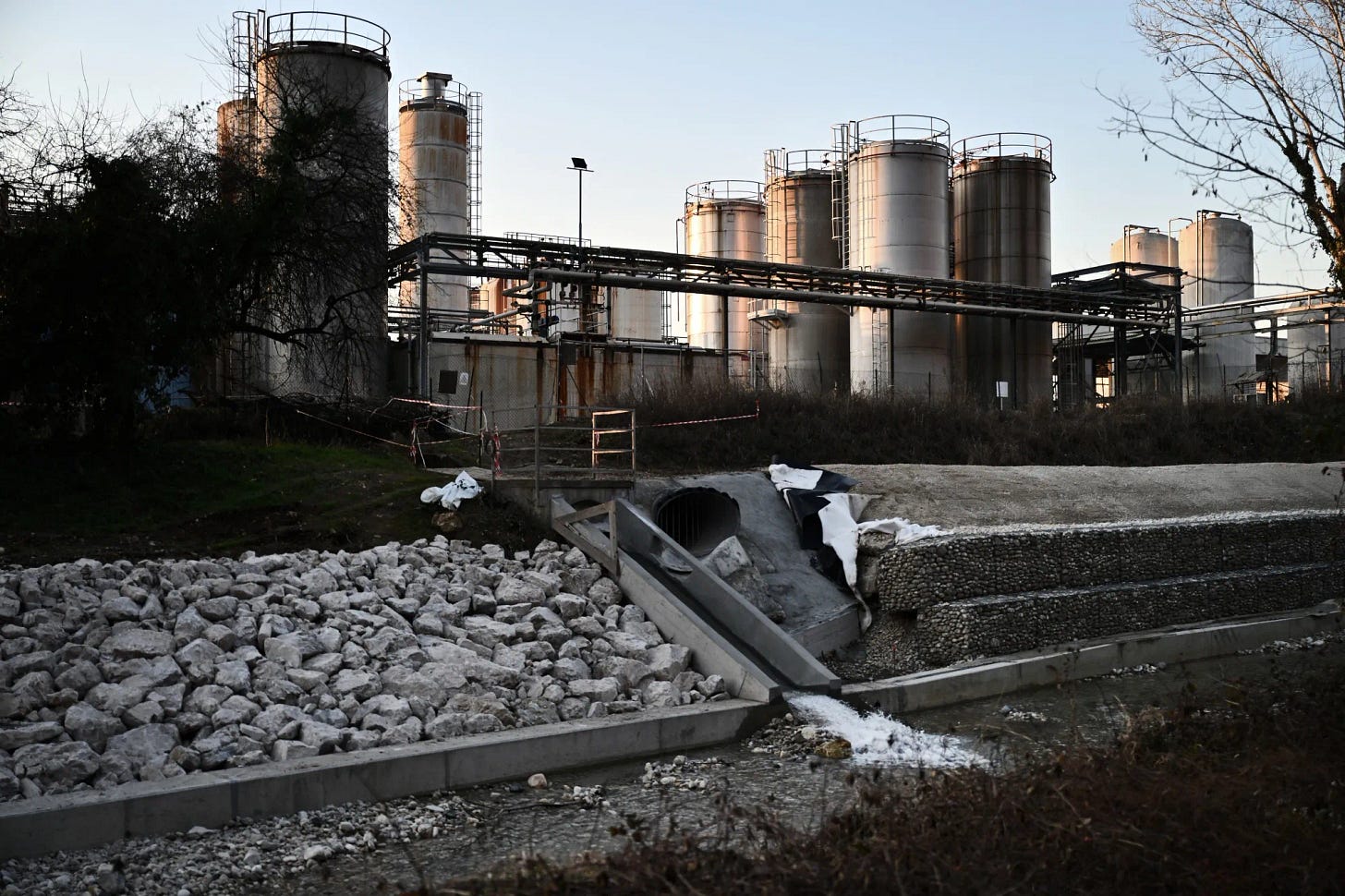Why Organic Matters More than Natural Wine
What you're spraying in the vineyard matters more than a pinch of sulphites
Two articles caught my attention over the past week, and my brain linked them into this little essay.
The first was a report from Emma Bentley (who runs the VinNatur winemaker’s association based in the Veneto), on a landmark court case. Eleven executives who worked for now-bankrupt chemical company Miteni were sentenced to a total of 141 years in prison, on environmental pollution and fraud charges.
The case centred on pollution from perfluoroalkyl substances (PFAS). These so-called forever chemicals take millennia to break down and are associated with an increased risk of cancer in both animals and humans. The court’s judgement was that the pollution affected 300,000 inhabitants and resulted in over 4,000 deaths in north-eastern Italy.
As PFAS contaminated the water supply over a large area around Padua, Verona and Vicenza, there are implications for the surrounding wine regions. Parts of the Prosecco DOC area were affected. It follows that the consumption of grapes, wine or any other agricultural product grown in the region could expose you to PFAS residues.
The story clearly resonated with Emma, not just because she lives close to the polluted zone but also because of its relevance to her work. VinNatur requires that all its grower members farm organically - ie: without the use of synthetic pesticides or fertilisers. It does not however require that they hold organic certification. Instead, Vin Natur undertakes random pesticide residue testing of its member’s wines. And a number of growers have been caught out over the years.
PFAS are everywhere
Perhaps pesticide residues from vineyard spraying don’t sound very serious in comparison to the pollution of waterways with noxious chemicals. But it turns out that a number of pesticides may also contain PFAS. Even synthetic products that are PFAS-free may be packaged in materials that aren’t.
Growers who farm according to organic principles can rest assured they are not running this risk, because they don’t use synthetic pesticides. They might not be able to control what flows into their local waterways, but at least they are not adding to the toxic payload.
The cry from big pharma’s lobbyists is that pollution from copper usage is a far bigger evil then the odd systemic spray here and there. But the funny thing is, I don’t recall a single news story about someone dying from exposure to copper in the vineyards. Nor I have come across a court case or class action brought against organic farmers on the basis of their copper usage.
Knowing I might be biased, I read the wikipedia page on copper toxicity. Here are the points that stuck out:
Copper has a half-life of between two to four weeks once it’s in our systems. In other words, that’s the time it takes to break down to half its original concentration. Compare that to PFAS, which have been shown in studies to have a half-life of between 1.5 - 8 years.
At low levels, copper is essential to human health.
Levels of around 1.3mg/L of copper in water are generally deemed safe for human consumption.
The US Environmental Protection Agency “lists no evidence for human cancer incidence connected with copper.”
The use of copper in viticulture and its advantages and disadvantages compared to synthetic alternatives is a minefield. I have a folder full of peer-reviewed studies sat on my laptop which will eventually turn into one of the longest and most tedious articles I’ve ever written. Be thankful that’s not for today.
Organic Farming is not a Sales Device
The second article, Spain, France and Italy lead the way for certified organic vines, was published online by The Drinks Business a week ago. I read this whilst digesting the Italian court case.
I struggled with this piece, because its tone subtly positions organic certification as a sales category or a marketing device. The subject is a farming method that most opt for on ethical or sustainable grounds, so I felt a disconnect here.
The spectre of that decades old trope – that the organic symbol meant some kind of hippyish hair shirt plonk – also seems to be alive and well, judging by a dismaying quote from Vintage Roots’ Neil Palmer: “We’ve been banging the drum for nearly 40 years, but there’s still a lot of scepticism around organic wine.”
The idea that a wine might taste different merely because it has organic certification makes little sense to me. The vast majority of certified organic producers are not in the natural wine sector. They produce mainstream styles, often with considerable intervention in the cellar. Organic certification schemes generally concern themselves purely with farming, not with what happens afterwards during vinification.
Be that as it may, the soils and wines from such producers should at least be free from pesticide residues. That’s a major win not just for conscious consumers, but more particularly for those who live in the vicinity of the vineyards.
The thrust of The Drinks Business article is that organic wines still only represent a tiny niche: 4% of the world’s total wine consumption. I suggest two reasons why this might understate the sector’s importance: first, organic certified wines are more likely to be higher priced, so their slice of the value pie is probably a lot higher than the volume. Second, the number of growers who farm organically or biodynamically, but without certification, is substantial. And they are invisible in these statistics.






